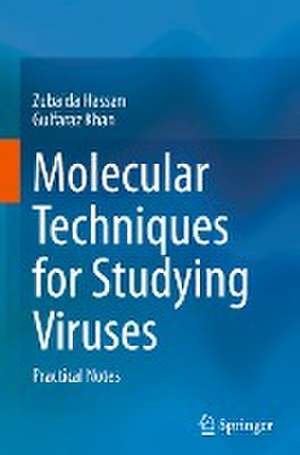Molecular Techniques for Studying Viruses: Practical Notes
Autor Zubaida Hassan, Gulfaraz Khanen Limba Engleză Hardback – 20 feb 2024
Preț: 996.28 lei
Preț vechi: 1214.98 lei
-18% Nou
Puncte Express: 1494
Preț estimativ în valută:
190.66€ • 198.80$ • 158.46£
190.66€ • 198.80$ • 158.46£
Carte disponibilă
Livrare economică 28 februarie-14 martie
Preluare comenzi: 021 569.72.76
Specificații
ISBN-13: 9789819980963
ISBN-10: 9819980968
Pagini: 91
Ilustrații: XXI, 91 p. 1 illus.
Dimensiuni: 155 x 235 mm
Greutate: 0.34 kg
Ediția:1st ed. 2024
Editura: Springer Nature Singapore
Colecția Springer
Locul publicării:Singapore, Singapore
ISBN-10: 9819980968
Pagini: 91
Ilustrații: XXI, 91 p. 1 illus.
Dimensiuni: 155 x 235 mm
Greutate: 0.34 kg
Ediția:1st ed. 2024
Editura: Springer Nature Singapore
Colecția Springer
Locul publicării:Singapore, Singapore
Cuprins
Chapter 1. Introduction.- Chapter 2. Isolation of Nucleic Acids.- Chapter 3. Isolation of Proteins.- Chapter 4. PCR-Based Techniques.- Chapter 5. Western Blotting.- Chapter 6. Serological Assays - Chapter 7. Immunoprecipitation.- Chapter 8. Small Interfering RNA.- Chapter 9. Histological Methods.- Chapter 10. Bioinformatics and In Silico Stimulations. Chapter 11. Summary and Conclusions.
Notă biografică
Dr. Zubaida Hassan is a lecturer in the Department of Microbiology, School of Life Sciences, Modibbo Adama University, Yola, Nigeria. She did her bachelor’s degree at the Federal University of Technology, Yola, Nigeria, her master's degree at the University Putra Malaysia, and PhD at the United Arab Emirates University. Zubaida's PhD project was on ‘Structural impact of Epstein-Barr virus-encoded small RNA-1 on its transport and function’. Zubaida has a few publications in peer‐reviewed journals and book chapters. She has also received several international conference scholarship awards from reputable organisations to attend and present her work.
Dr. Gulfaraz Khan is a professor of viral pathology in the Department of Medical Microbiology & Immunology, College of Medicine and Health Sciences, UAE University. Dr Khan received his undergraduate and postgraduate training in London (London School of Hygiene and Tropical Medicine, and St Bartholomew’s Hospital MedicalCollege), and his postdoctoral training at Tufts University School of Medicine and the University of Glasgow. Dr Khan’s primary research interests are in viral pathology and infectious diseases, with a particular focus on Epstein-Barr virus and its associated diseases. His secondary interest is in emerging viral infections and public health. He has received several awards for his teaching and research and is also a member of several national and international committees and organizations. He also serves on the editorial board of several international journals.
Dr. Gulfaraz Khan is a professor of viral pathology in the Department of Medical Microbiology & Immunology, College of Medicine and Health Sciences, UAE University. Dr Khan received his undergraduate and postgraduate training in London (London School of Hygiene and Tropical Medicine, and St Bartholomew’s Hospital MedicalCollege), and his postdoctoral training at Tufts University School of Medicine and the University of Glasgow. Dr Khan’s primary research interests are in viral pathology and infectious diseases, with a particular focus on Epstein-Barr virus and its associated diseases. His secondary interest is in emerging viral infections and public health. He has received several awards for his teaching and research and is also a member of several national and international committees and organizations. He also serves on the editorial board of several international journals.
Textul de pe ultima copertă
This volume provides detailed information on various laboratory techniques and methodologies used for studying viruses at the molecular level. It covers essential topics such as nucleic acid isolation, protein isolation, PCR-based techniques, western blotting, serological assays, immunoprecipitation, small interfering RNA (siRNA), histological methods, bioinformatics and in silico simulations. Each chapter provides a detailed overview of the techniques, their applications, and their significance in virus research. The book is a useful resource as a practical introductory note that could be used for hands-on training of students, both undergraduates and junior postgraduates.
Caracteristici
Covers isolation of nucleic acids, proteins, PCR techniques, serological assays, and more Introduces PCR-based techniques, immunoprecipitation, siRNA, and Western blotting for virus research Explores in silico simulations, histological methods, and bioinformatics for analyzing viral data
